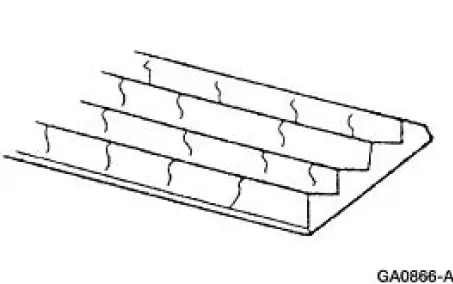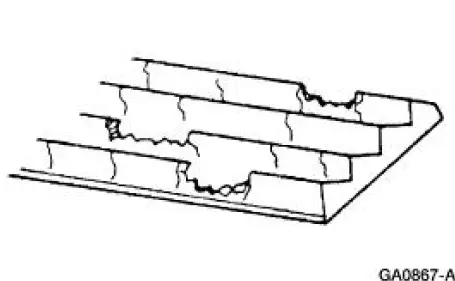Ford Mustang (1999-2004) Service Manual: Inspection and Verification
1. Verify customer concern by running the engine.
2. Inspect the drive belt for chunking, fraying and wear.
3. Check the drive belt for correct routing.
Drive Belt Cracking/Chunking/Wear
V Ribbed Serpentine Drive Belt With Cracks Across Ribs

The accessory drive:
- has a single serpentine drive belt.
- has an automatic drive belt tensioner.
- does not require adjustment.
V Ribbed Belt With Chunks of Rib Missing

Symptom Chart
| Condition | Possible Sources | Action |
|
|
|
|
|
|
 Component Tests
Component Tests
Drive Belt Noise/Flutter
Drive belt chirp occurs due to pulley misalignment or excessive pulley runout.
It can be the result of a
damaged pulley or an incorrectly aligned pulley.
To correct, determi ...
Other materials:
Tire Wear Chart
Wheel and tire NVH concerns are directly related to vehicle speed and are not
generally affected by
acceleration, coasting or decelerating. Also, out-of-balance wheel and tires can
vibrate at more than
one speed. A vibration that is affected by the engine ...
Steering System Symptom Definitions
Drift/Pull
Pull is a tugging sensation, felt by the hands on the steering wheel, that
must be overcome to keep the
vehicle going straight.
Drift describes what a vehicle with this condition does with hands off the
steering wheel.
A vehicle-related drift/p ...
Transmission Fluid Drain and Refill
Special Tool(s)
Automatic Transmission Flush
and Fill Machine
211-00018
Automatic Transmission Flush
and Fill Machine
199-00010 or equivalent
Material
Item
Specification
MERCON V Automatic
Transmission Fluid
XT-5-QM
M ...

